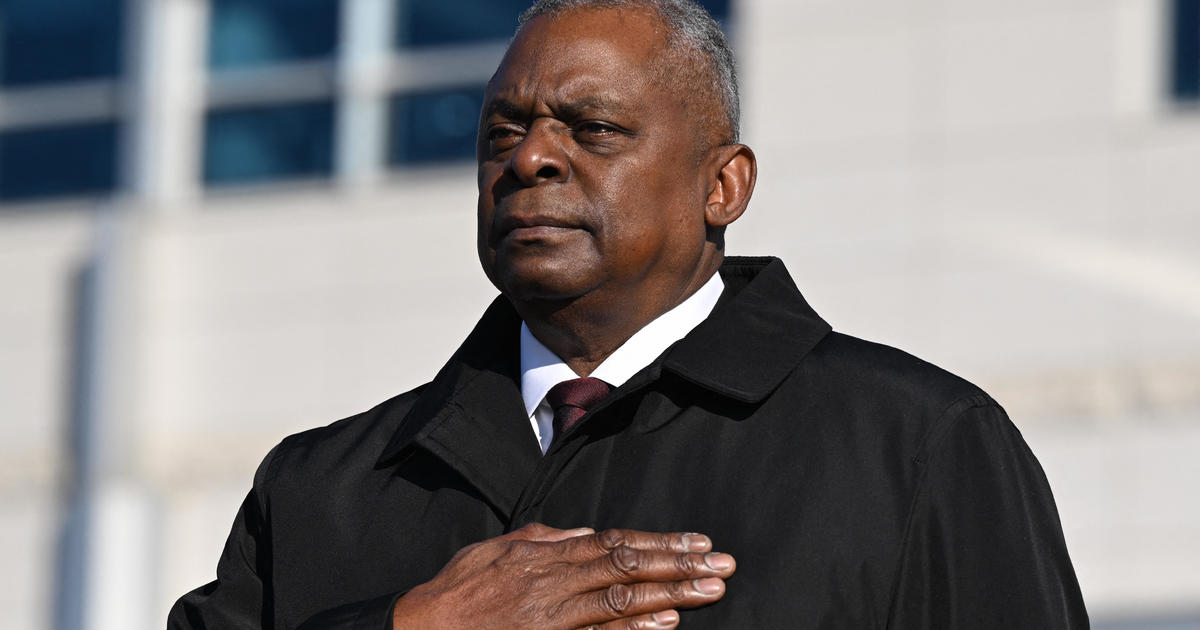Timeline: Defense Secretary Lloyd Austin's hospitalization
After days of not revealing what prompted Defense Secretary Lloyd Austin's hospitalization, the Pentagon disclosed Tuesday that Austin had previously been treated for prostate cancer.
A statement from medical providers at Walter Reed National Military Medical Center released by the Pentagon said Austin underwent a surgical procedure to treat prostate cancer in December, and his hospitalization over the past week was related to complications he started experiencing on New Year's Day.
The statement said Austin's "prostate cancer was detected early, and his prognosis is excellent."
The information comes as the Pentagon faces criticism for not informing the White House, Congress or the public of Austin's hospitalization sooner.
The president was not informed of Austin's cancer diagnosis until Tuesday morning, several weeks after the initial surgical procedure, the White House said Tuesday.
Although Austin was hospitalized on Jan. 1, the White House and Deputy Secretary of Defense Kathleen Hicks, who took over some responsibilities on Jan. 2, did not know Austin had been hospitalized until Jan. 4, when Austin's chief of staff notified them, according to the Pentagon.
Ryder said Monday that the delay was due in part to the fact that Austin's chief of staff, Kelly Magsamen, was sick with the flu.
When pressed by reporters on why the chief of staff, even if sick, was unable to make notifications sooner, Ryder replied, "I'm offering you the facts as we have them, in terms of an explanation of how this happened and also the fact that we will review our procedures and look at how we can do better in the future."
Here's a timeline of major events — and when information about them was disclosed:
- Early December 2023: Medical providers identify prostate cancer, which requires treatment. (Statement from officials at Walter Reed National Military Medical Center officials, Jan. 9)
- Dec. 22: Austin undergoes an elective medical procedure while on leave. (Ryder discloses procedure on Jan. 5; Ryder discloses the date of the procedure on Jan. 7)
- Dec. 23: Austin is discharged and goes home. (Ryder briefing, Jan. 8)
- Jan. 1, 2024: President Biden holds a call on the situation in the Middle East with Austin, Secretary of State Antony Blinken and national security adviser Jake Sullivan. (National Security Council spokesperson John Kirby briefing, Jan. 8).
- Jan. 1: Austin experiences "severe abdominal, leg, and hip pain" and is transported to Walter Reed National Military Medical Center. Initial evaluation reveals a urinary tract infection. (Walter Reed Statement, Jan. 9).
- Jan. 2: Austin is transferred to the intensive care unit for close monitoring and a higher level of care. (Walter Reed Statement, Jan. 9)
- Jan. 2: Some operational responsibilities are transferred to Hicks. (Ryder briefing, Jan. 8)
- Jan. 2: Chairman of the Joint Chiefs of Staff Gen. C.Q. Brown is notified Austin has been hospitalized. (Ryder briefing, Jan. 8)
- Jan. 2: Pentagon press secretary, Austin's chief of staff and Austin's senior military adviser learn Austin is in the hospital. (Ryder briefing, Jan. 8.)
- Jan. 4: The U.S. conducts a strike in Baghdad at 12 p.m. local time, according to a defense official. Ryder said on Jan. 8 that Mr. Biden and Austin had approved the strike before Austin was hospitalized.
- Jan. 4: Defense Department chief of staff notifies deputy secretary of defense and the White House that Austin is in the hospital. President Biden learns Austin has been hospitalized. (Ryder briefing, Jan. 8; Kirby briefing, Jan. 9)
- Jan. 5: Senate Armed Services Committee is informed of Austin's hospitalization. (A Senate Armed Services Committee aide told CBS News).
- Jan. 5: Pentagon releases first public statement that says Austin has been hospitalized since Jan. 1.
- Jan. 5: Austin resumes full duties from Walter Reed in the evening. (Ryder statement, Jan. 7)
- Jan. 6: Austin releases a statement taking responsibility for delayed disclosure.
- Jan. 6: Mr. Biden and Austin speak; the president says he has full confidence in Austin. (U.S. official, Jan. 8).
- Jan. 8: Austin is no longer in ICU and is recovering in a private area of Walter Reed. (Ryder briefing, Jan. 8)
- Jan. 9: Pentagon releases statement from Walter Reed Military Medical Center disclosing that the procedure Austin had undergone was a prostatectomy "to treat and cure prostate cancer."
- Jan. 9: President Biden is informed of Austin's diagnosis. (Kirby briefing, Jan. 9)
The White House and Pentagon are reviewing their notification processes and procedures, Ryder and Kirby announced Monday. In a memo to Cabinet secretaries obtained by CBS News on Tuesday, White House chief of staff Jeff Zients outlined interim procedures for agencies to follow until new guidelines are established.
The procedures include notifying the Offices of Cabinet Affairs and the White House chief of staff when authority is delegated or anticipated to be delegated. The delegation of authority should be documented in writing when it's in effect, the memo said.
Ryder on Monday personally apologized for not pushing for more information to be released to the public sooner.
Arden Farhi, Alan He, David Martin, Weijia Jiang, Kristen Brown, and Bo Erickson contributed to this report.
for more features.




